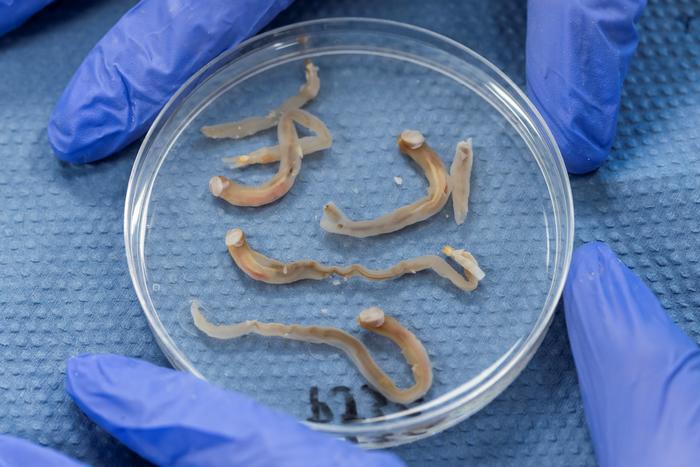PRESS RELEASE FROM THE UNIVERSITY OF CAMBRIDGE

Credit: University of Plymouth
PRESS RELEASE FROM THE UNIVERSITY OF CAMBRIDGE
EMBARGOED UNTIL 10:00 LONDON TIME (GMT) ON 20 NOVEMBER, 2023
[Photographs and a copy of the paper are available here]
These long, white saltwater clams are the world’s fastest-growing bivalve and can reach 30cm long in just six months. They do this by burrowing into waste wood and converting it into highly-nutritious protein.
The researchers found that the levels of Vitamin B12 in the Naked Clams were higher than in most other bivalves – and almost twice the amount found in blue mussels.
And with the addition of an algae-based feed to the system, the Naked Clams can be fortified with omega-3 polyunsaturated fatty acids – nutrients essential for human health.
Shipworms have traditionally been viewed as a pest because they bore through any wood immersed in seawater, including ships, piers and docks.
The researchers developed a fully-enclosed aquaculture system that can be completely controlled, eliminating the water quality and food safety concerns often associated with mussel and oyster farming.
And the modular design means it can be used in urban settings, far from the sea.
“Naked Clams taste like oysters, they’re highly nutritious and they can be produced with a really low impact on the environment,” said Dr David Willer, Henslow Research Fellow at the University of Cambridge’s Department of Zoology and first author of the report.
He added: “Naked Clam aquaculture has never been attempted before. We’re growing them using wood that would otherwise go to landfill or be recycled, to produce food that’s high in protein and essential nutrients like Vitamin B12.”
Scientifically named Teredinids, these creatures have no shell, but are classed as bivalve shellfish and related to oysters and mussels.
Because the Naked Clams don’t put energy into growing shells, they grow much faster than mussels and oysters which can take two years to reach a harvestable size.
The report is published today in the journal Sustainable Agriculture.
Wild shipworms are eaten in the Philippines – either raw, or battered and fried like calamari. But for British consumers, the researchers think Naked Clams will be more popular as a ‘white meat’ substitute in processed foods like fish fingers and fishcakes.
“We urgently need alternative food sources that provide the micronutrient-rich profile of meat and fish but without the environmental cost, and our system offers a sustainable solution,” said Dr Reuben Shipway at the University of Plymouth’s School of Biological & Marine Sciences, senior author of the report.
He added: “Switching from eating beef burgers to Naked Clam nuggets may well become a fantastic way to reduce your carbon footprint.”
The research is a collaboration between the Universities of Cambridge and Plymouth, and has attracted funding from sources including The Fishmongers’ Company, British Ecological Society, Cambridge Philosophical Society, Seale-Hayne Trust, and BBSRC
The team is now trialling different types of waste wood and algal feed in their system to optimise the growth, taste and nutritional profile of the Naked Clams – and is working with Cambridge Enterprise to scale-up and commercialise the system.
ENDS.
Reference
Willer, D.F. et al: ‘Naked Clams to open a new sector in sustainable nutritious food production.’ Sustainable Agriculture, Nov 23. DOI: 10.1038/s44264-023-00004-y
Contact details
Charis Goodyear, Communications Coordinator, Office of External Affairs and Communications, University of Cambridge [email protected]
Dr David Willer, Department of Zoology, University of Cambridge [email protected]
About the University of Cambridge
The University of Cambridge is one of the world’s top ten leading universities, with a rich history of radical thinking dating back to 1209. Its mission is to contribute to society through the pursuit of education, learning and research at the highest international levels of excellence.
The University comprises 31 autonomous Colleges and 150 departments, faculties and institutions. Its 24,450 student body includes more than 9,000 international students from 147 countries. In 2020, 70.6% of its new undergraduate students were from state schools and 21.6% from economically disadvantaged areas.
Cambridge research spans almost every discipline, from science, technology, engineering and medicine through to the arts, humanities and social sciences, with multi-disciplinary teams working to address major global challenges. Its researchers provide academic leadership, develop strategic partnerships and collaborate with colleagues worldwide.
The University sits at the heart of the ‘Cambridge cluster’, in which more than 5,300 knowledge-intensive firms employ more than 67,000 people and generate £18 billion in turnover. Cambridge has the highest number of patent applications per 100,000 residents in the UK.
www.cam.ac.uk
DOI
10.1038/s44264-023-00004-y
Article Title
Naked Clams to open a new sector in sustainable nutritious food production
Article Publication Date
20-Nov-2023




